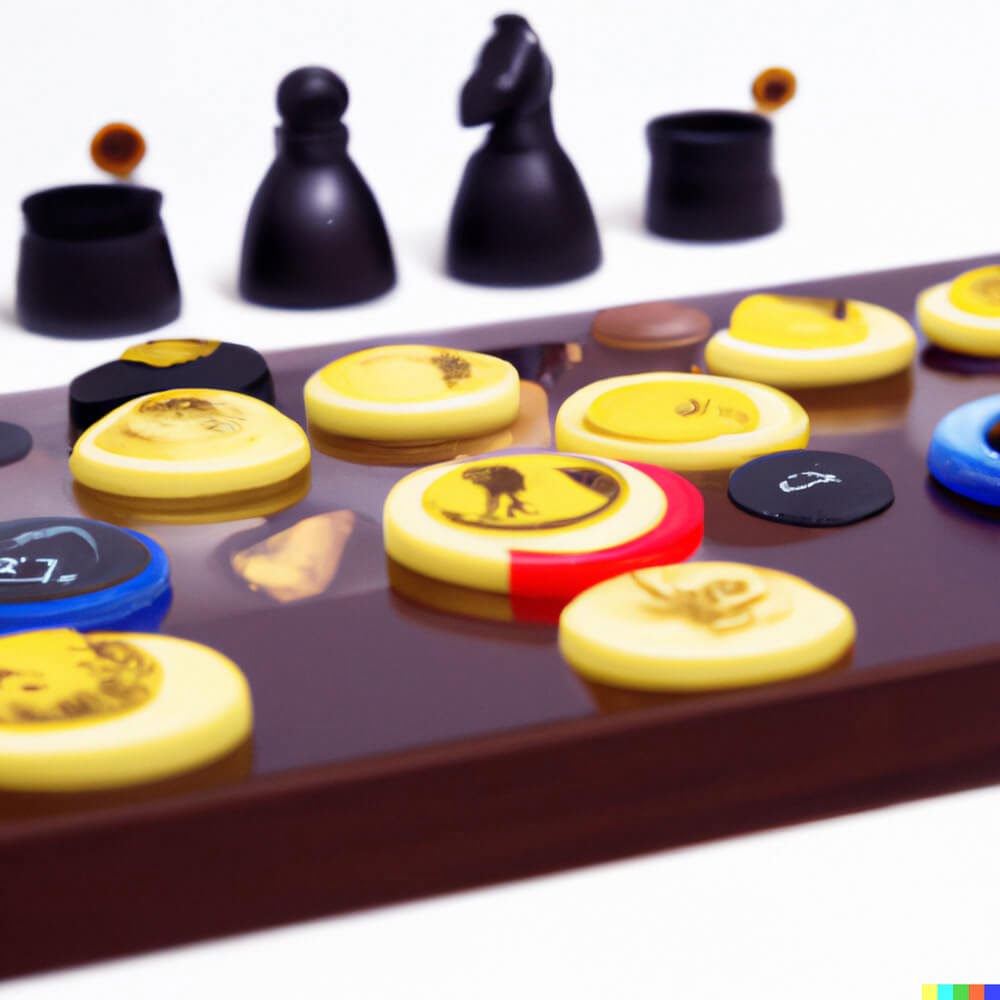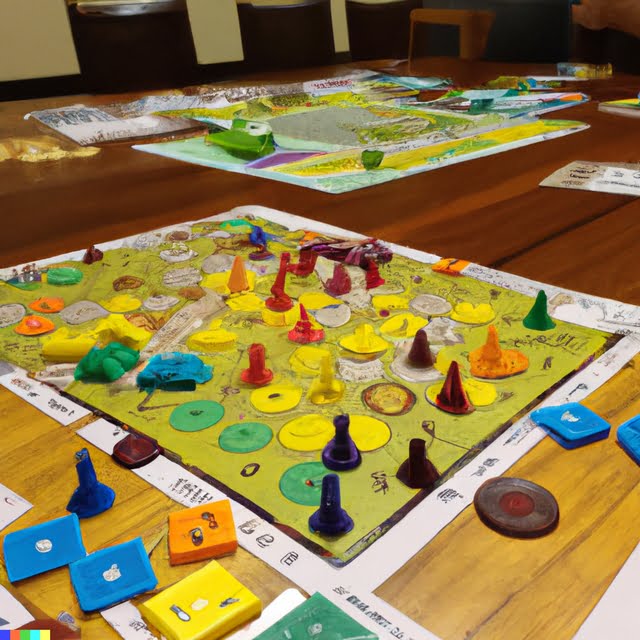Introduction
Board games are an entertaining and fun way to pass the time. Playing them with family and friends is a great way to stay connected and increase your bond. They can also help to keep your mind sharp as good board games often require tactics and strategy, as well as critical thinking skills. In addition, there are many different types of board games, from educational ones to “drinking” games with lots of noise. This means that everyone can find something they like playing!
There are many additional reasons why board games are a fantastic form of entertainment. First of all, they create opportunities for socializing. By gathering around the table together, you get the chance to strengthen relationships between friends and family members or even make new connections with other players in the game. Board games also do not require any complex technology; all that is needed is a table, some chairs, potentially some paper and pencils if it’s a creative game like Pictionary or Mad-Libs etc., just a bit of time and imagination!
Furthermore, whether you choose to play alone or in teams, this type of gaming helps to sharpen minds by engaging players in thought processes such as problem-solving strategies and improving technique. Additionally, unlike video games where individual strategies may not always be successful due to luck in terms of computer programming, board game strategies often guarantee success when correctly used because it typically more purely relies on skill-based play rather than chance elements featured in some electronic versions of these classic classics! Board games also promote memory building which helps people remember things better over time for various tasks outside gaming itself.
In conclusion, board games provide much enjoyment through social interaction and mental stimulation while teaching players strategy skills which will help them be successful outside of the gaming world. As long as there is no disruption caused by those who try to cheat and spoil the fun for everyone else (or those who refuse to follow the rules), group sessions around a table can offer plenty of laughter while at the same time activating creativity within participants too! Thank you very much for reading this article on how playing boardgames can benefit us both mentally and socially – I hope you have found it informative!
Developing Social Skills Through Board Games
Board games are an enjoyable way to pass the time while developing important social skills at the same time. Playing board games helps improve communication between players by encouraging face-to-face interaction as well as teaching children how to cope with winning, losing, and sharing. It also fosters collaboration, team building, problem solving and dispute resolution. Through quickly taking turns and following rules, children learn how to interact in a structured environment and negotiate potential conflicts. Furthermore, board games provide an opportunity for idea sharing, strategy formulation and critical thinking which helps boost creative thinking and aids in mental stimulation. Games can teach kids about mathematics, science, geography, history or any other topics that require memorization or critical thinking. Lastly, it is great family bonding time as such activities are especially beneficial when done together with parents or peers. Board games may just seem like casual pastime fun but in reality they help develop many of the necessary skills needed for future development in life!
The Cognitive Benefits of Board Games
Board games offer an array of cognitive benefits for players of all ages. Not only do board games provide entertainment, but they can also stimulate the mind in ways that are otherwise difficult to replicate. Playing board games allows players to increase their focus, problem-solving abilities, memory functioning, and strategic thinking skills. The brain must confront a variety of complex elements such as rule comprehension and turn-taking strategies as well as identify advantageous opportunities and assess risk versus reward. Additionally, board games require players to think in multiple dimensions including spatial rotation, number operations, probability and puzzle solving. This helps participants develop their ability to practice abstract and logical reasoning. Furthermore, playing the game with others calls for increased communication skills”such as verbal negotiations or finding common ground”particularly when the competition is strong. Board games encourage healthy competition while fostering important social concepts like empathy and cooperation between players due to shared objectives within varying levels of play. For younger children, playing a game repeatedly may not only aid cognitive development but also build on essential executive function skills like organizing materials or maintaining ‘good sportsmanship’ when a competitor wins. Most importantly, playing board games can be a great source of fun for all involved!
Education and Board Games
Board games are not only a great source of entertainment, but they can also be extremely beneficial for children’s development. Board games provide children with the opportunity to learn various skills such as problem solving, decision-making and critical thinking. These skills are essential for kids in their school lives and beyond. Games can also help to teach them important life lessons such as strategy, planning and patience as well as foster cooperation and teamwork. The interactive nature of board games also helps to strengthen relationships between family members encouraging communication and collaboration. Board game play can also improve motor skills while keeping the mind engaged thus boosting cognitive development. Additionally, games help to improve memory and become an effective learning tool allowing children to keep tested knowledge in easily accessible locations within their brains. Finally, playing board games encourages social interaction which is essential in building empathy among players ” a key trait needed when interacting with others throughout life.
Kicking it Up a Notch
Board games are a great way to bring family and friends together for a night of fun and camaraderie. Not only do board games provide entertainment, but they can also be highly beneficial for cognitive development. One specific way board games benefit players is through the promotion of enhanced memory and mental agility.
There are numerous memory-building board games available on the market today. These special types of games involve recalling certain facts or remembering the positioning and details of cards, pieces or tiles on the game’s playing board. Memory-enhancing board games also exercise other important intellectual capabilities such as logic, problem solving strategies and spatial reasoning. In addition to improving short-term memory, these tactical skills help people develop better analytical thinking, resource management strategies and decision making aptitude which are fundamental talents used in daily life.
Given the cognitive advantages that such games offer, experts recommend them for people of all ages ” from preschoolers to seniors. Such tests regularly challenge the brain so that it can maintain its peak working capacity over time – something especially advantageous for children who want to boost their academic capacity or seniors aiming to preserve their mental faculties into old age. Therefore, should you wish to sharpen your memory as well as pass an enjoyable evening with your loved ones, consider buying a few memory-enhancing board games from your local gaming store!
Building Connections
Family board games can provide an opportunity for parents and children to spend quality time together, while fostering stronger connections. Activities like playing board games strengthen relationships between family members by creating a conversation-based atmosphere. Board games can also be used to help teach valuable lessons, such as patience and sportsmanship, as families compete against each other in a fun and friendly setting. Board game nights have proven to be a great way to bond with family members of all ages ” from the little ones who can play simpler versions of the game, to older siblings and adults that can take on more challenging versions.
In addition to strengthening familial bonds, board games have other advantages as well. They help build problem solving skills and cognitive development, enhance communication skills, foster team work skills, promote social skills, and increase self-esteem. As members of the same team or group, family members are able to practice collaboration rather than competition when it comes down to winning the game, giving everyone involved a sense of accomplishment. Besides sharpening academic abilities during game play mechanics such as logic reasoning and problem solving that would otherwise not be encountered in most daily activities come into play during every match. Alternatively if your household loves puzzles they could embark on jigsaw quests together or even explore new realms through roleplaying adventure titles!
Harnessing Communication Skills Through Board Games
Playing board games can be an effective way to help improve people’s communication skills. One way board games do this is by creating an environment where communication between individuals is necessary. Playing a game gives participants the opportunity to discuss strategies, ideas, and tactics in order to win, while also teaching them the importance of compromise and patience when communicating with each other.
Another advantage of playing board games that helps facilitate better communication skills is that it provides a safe space for everyone involved. Unlike video games or other electronic entertainment that involves players only interacting with one another through a screen, board games provide an alternative in which every player has equal footing and must actively engage in conversation with each other. This makes for a more open and resourceful exchange of information – something beneficial for developing verbal communication skills.
Board games can also help sharpen problem-solving skills by teaching people different techniques for dealing with disagreements and finding collective solutions. By exploring different approaches on how to approach difficult obstacles within the game, such as assessing risk or analyzing a problem from various perspectives, participants are learning problem-solving strategies that they can transfer over into their daily lives outside of the game. Board games can provide opportunities for learning through conquering challenges together, encouraging people to apply their skills in ways that will help them succeed within their communities and careers as well. Additionally, board games promote teamwork and cooperation amongst groups of people who have different opinions and backgrounds, thus allowing them to communicate better from multiple angles on mutual goals.
Unlocking Other Benefits of Board Games
Board games can be much more than a great source of entertainment. They can also help to improve your cognitive development, communication skills, social skills, and even creativity. Studies have found that board games can help sharpen analytical and problem-solving skills and improve memory and concentration. When playing board games, people must think strategically while considering multiple factors in order to win the game. As players work together or against each other to make in-game decisions, they develop their critical thinking capabilities and hone their decision-making abilities.
When it comes to interpersonal skills, board games are a great way for people to practice communicating with others effectively, coming up with creative solutions to problems collectively, taking criticism without getting defensive and developing negotiation strategies. Allowing for healthy competition between family members or close friends is also beneficial when it comes to teaching children how to cope with defeat gracefully and recognize success with humility. Furthermore, players can learn how to take risks without experiencing the drawbacks of real-life consequences because there’s no significant financial loss involved in losing a game”only the opportunity for some good old-fashioned learning from mistakes!
In addition to these benefits, board game play sparks creativity by having the players use their imaginations as they create unique playing styles while responding quickly but wisely to changing conditions away from the rigid structure of traditional classroom learning. As they look at different scenarios through different perspectives, participants easily dive into collective brainstorming sessions which lead to ingenious ideas both on and off the gaming table. Ultimately, participants are often rewarded by realizing objectives in context of interactive play that provide real world benefits like improving cooperation behaviours and putting independent ideas together towards something bigger than themselves.
How to Make the Right Choice
When selecting board games, it is important to factor in the age of the players. Some board games pegged at an adult audience may contain themes too complicated or mature for young children to understand. Asking questions about their level of understanding is essential if you want each player to be able to enjoy the game without any confusion regarding the rules or objectives.
Aside from considering age, another important point when selecting a board game is determining who will play it and how many people can be involved in a single game. Some board games offer strategic opportunities that are best enjoyed with a small group of players such as family or close friends, while other games require lots of participants or even teams in order to successfully have fun and play the game according to its rules and instructions.
Another factor for choosing which board game is right for you is deciding what kinds of activities or features you would like included with the game. Most classic board games rely on little more than luck, while others involve strategy; some focus on problem-solving skills and collaboration among players, while others might be based on memory, trivia and knowledge testing. Take into account what kind of experience you are hoping to get out of playing and choose accordingly.
Finally, look closely at the design quality and production materials of the game before buying it. Check reviews online regarding its complexity, components used like pieces and boards, topics discussed during gameplay (if they could potentially trigger uncomfortable conversations within your group), packaging sortage & physical durability etc.. The overall quality might make all the difference between an exciting match and a complete disaster!
Going Out With a Bang
Board games are a great way to bring people together, have fun and focus on something other than scrolling through your phones. Playing a board game encourages teamwork, conversation and strategic thinking. All of these qualities contribute to socializing and having a good time. But if you’re looking to get the best out of your board game night, here’s how you can maximize the experience:
1. Think beyond the classics ” Don’t underestimate the power of novelty when it comes to board games. Make sure everyone has a chance to play something they haven’t tried before. It can be fun to try something new that encourages imaginative play or skill-based competition.
2. Set some friendly rules ” Agreeing on how the games will be played upfront helps create an atmosphere for successful game play for all players involved. Setting expectations such as language used during gameplay or showing good sportsmanship will ensure everyone is having fun from start to finish.
3. Create an enjoyable atmosphere ” Board game nights should be fun! Match the game choice with your mood; playing Cards Against Humanity may not always be appropriate for all guests, for example! Also, it’s a bonus when there’s good music playing in the background or you choose engaging activities between rounds so that nobody gets bored or feels left out while they wait their turn in a particular game. Lastly, don’t forget snacks”who said anything about board games being boring?
4. Remember, it’s just an opportunity to have fun ” Everyone makes mistakes in games but at the end of the day it doesn’t matter who wins or loses ” it’s important simply to have fun together and build relationships around you! After all, that’s what it’s primarily about!

I love playing all kinds of games – from classics like Monopoly to modern favourites like Ticket to Ride.
I created this blog as a way to share my love of board games with others, and provide information on the latest releases and news in the industry.





